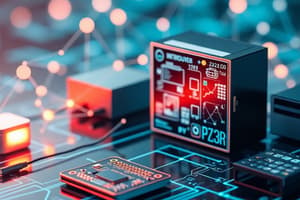Podcast
Questions and Answers
What does IoT stand for?
What does IoT stand for?
- Internet of Technology
- Interconnected Online Tools
- Integrated Operational Techniques
- Internet of Things (correct)
IoT devices can only collect data and do not have the ability to communicate with each other.
IoT devices can only collect data and do not have the ability to communicate with each other.
False (B)
What technology enables IoT devices to communicate and exchange data?
What technology enables IoT devices to communicate and exchange data?
Internet
IoT is a system of interrelated things, computing devices, mechanical and digital machines, objects, animals, or people that are provided with unique ______.
IoT is a system of interrelated things, computing devices, mechanical and digital machines, objects, animals, or people that are provided with unique ______.
Which of the following is NOT an example of an IoT device?
Which of the following is NOT an example of an IoT device?
List one application of IoT in healthcare.
List one application of IoT in healthcare.
What is a primary function of the cloud in IoT systems?
What is a primary function of the cloud in IoT systems?
IoT technology has the potential to transform various industries.
IoT technology has the potential to transform various industries.
IoT systems generate vast amounts of ______ that can be analyzed to improve operations.
IoT systems generate vast amounts of ______ that can be analyzed to improve operations.
Flashcards are hidden until you start studying
Study Notes
Internet of Things (IoT) Overview
- IoT connects physical devices like appliances and vehicles, embedding them with software, sensors, and connectivity for data exchange.
- The network allows for data collection from a vast array of devices, promoting efficient and automated operations.
Key Characteristics of IoT
- Interconnectedness of devices enables communication and sensing interactions.
- IoT supports significant advancements in sectors like medicine, agriculture, smart cities, and energy.
Major Components of IoT
- Comprises IoT devices, communication networks, gateways, and cloud-based data processing systems.
- Data collected through sensors is sent to the cloud for analysis, storage, and centralized management.
Building Blocks of IoT
- Involves various technologies including wireless communication protocols, cloud computing, big data analytics, and machine learning.
- Security technologies are essential for protecting IoT systems.
Physical and Logical Design of IoT
- Physical design relates to the hardware and actual devices in an IoT system.
- Logical design focuses on the architecture of the software and communication protocols utilized.
Greenfield and Brownfield IoT
- Greenfield IoT refers to new projects built from scratch, while Brownfield IoT focuses on integrating IoT solutions into existing infrastructures.
Governance, Privacy, and Security Issues
- IoT systems raise significant concerns about data privacy, security vulnerabilities, and governance frameworks to manage these challenges.
Examples of IoT Devices
- Smart home devices: Thermostats, lighting systems, security systems.
- Wearables: Fitness trackers, smart watches that collect health data.
- Healthcare devices: Patient monitoring systems and wearable medical devices.
- Industrial systems: Predictive maintenance and supply chain management.
- Transportation: Connected cars and autonomous vehicles.
Impact of IoT on Industries
- Transforming sectors such as healthcare, manufacturing, transportation, and energy by enabling new business opportunities and driving innovation.
Data Generation and Analysis
- IoT devices generate vast amounts of data used for improving operations and creating meaningful actions based on data interchange.
Real-Life Applications of IoT
- Smart watches for fitness tracking with accelerometers and GPS.
- Smart home systems for managing locks and security through applications.
Future of IoT
- The field of IoT is rapidly evolving, with continuous expansion in innovation and growth opportunities across various applications and sectors.
Studying That Suits You
Use AI to generate personalized quizzes and flashcards to suit your learning preferences.




